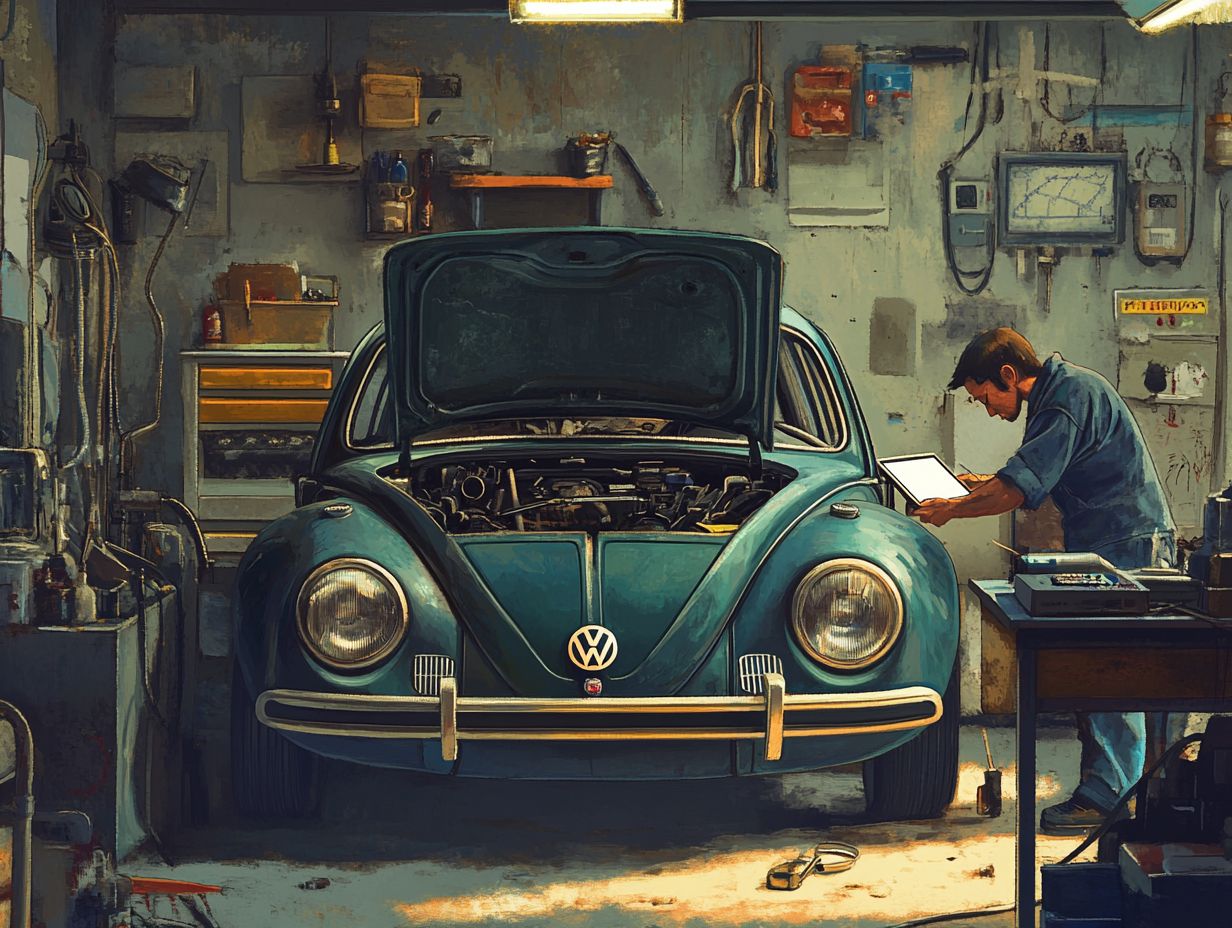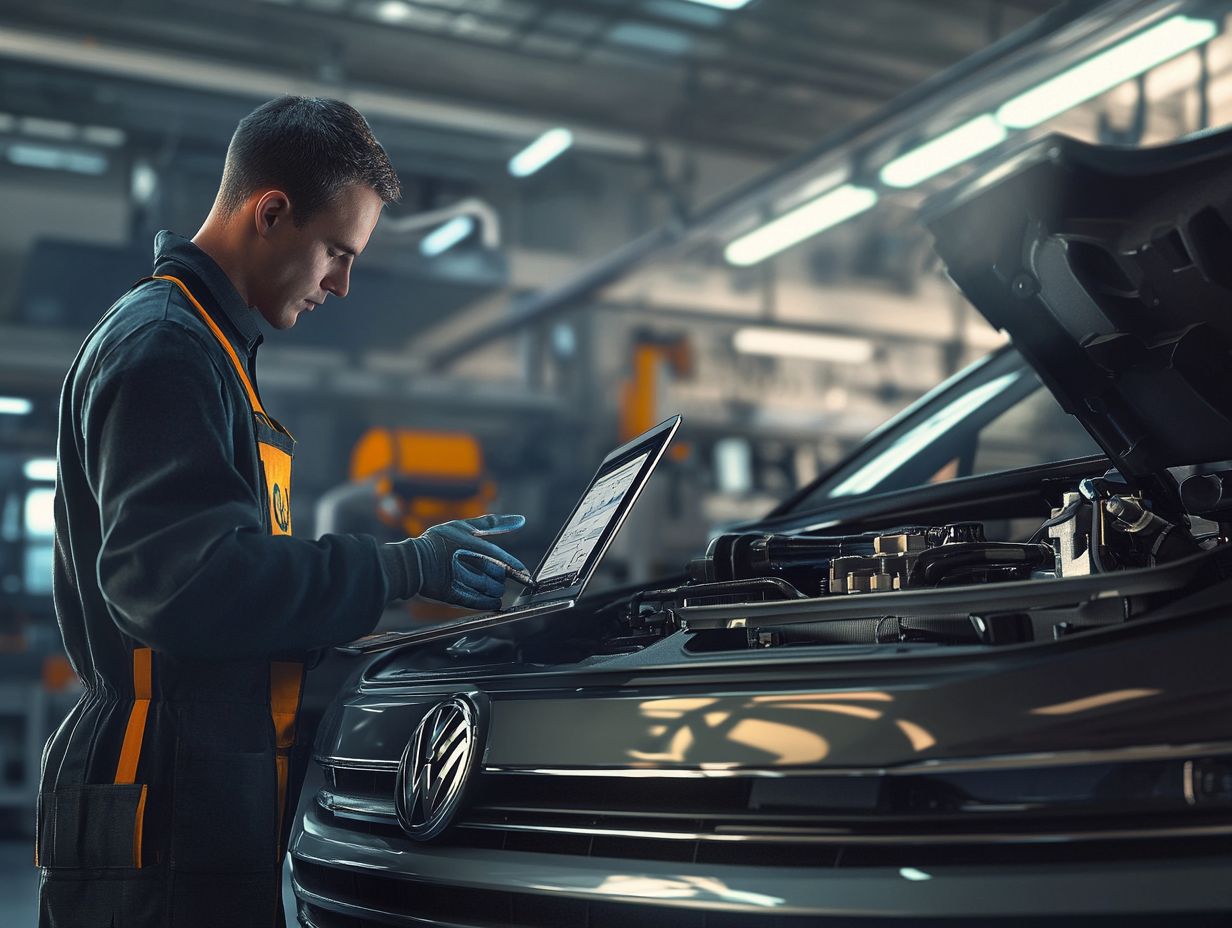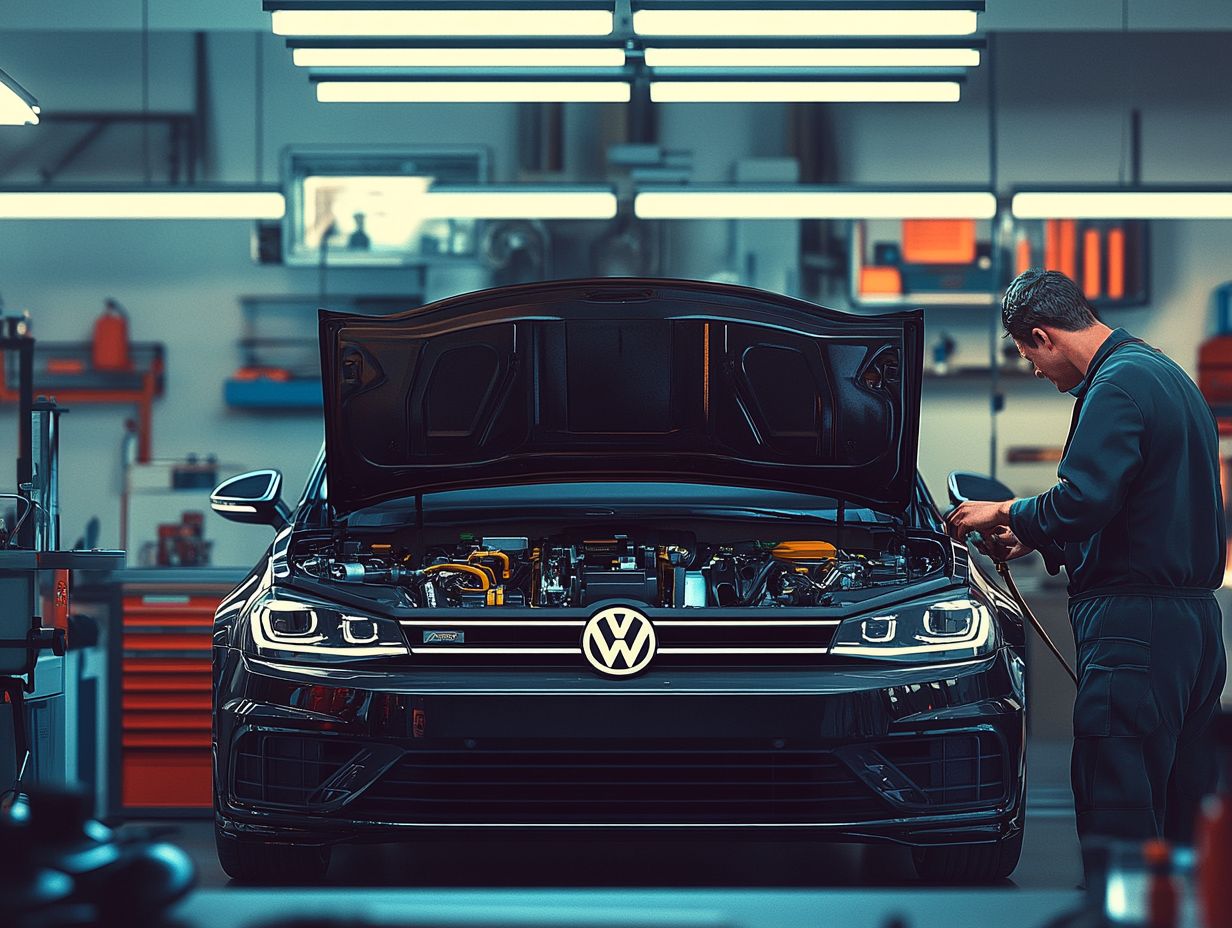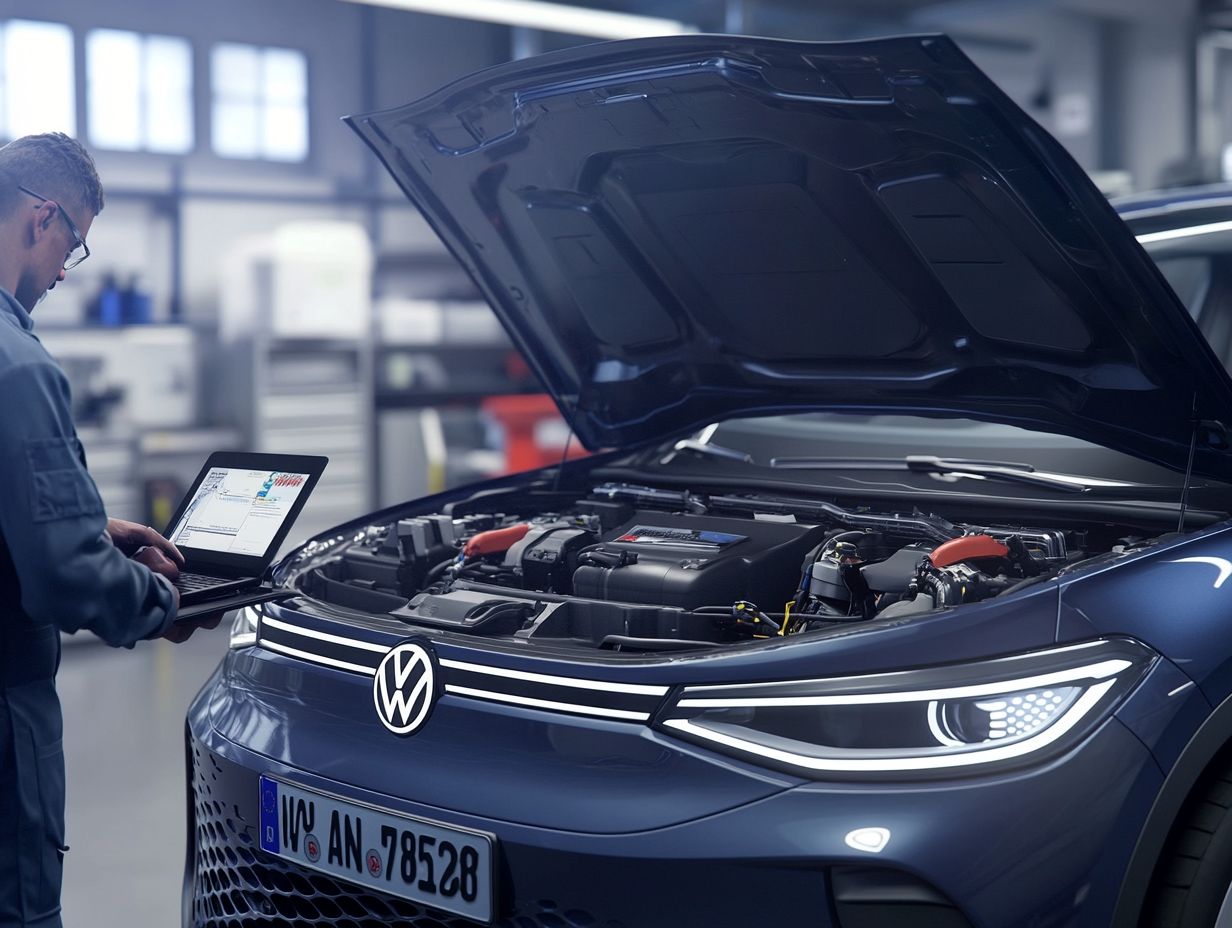Are Volkswagens Expensive to Repair?
Maintaining a Volkswagen can definitely be a rewarding experience, but I’ve learned that understanding repair costs is essential for any owner like me.
In this overview, I’ll cover the factors that influence repair expenses, highlight some common issues that VW drivers often face, and give you an idea of typical repair costs.
I’ll also dive into practical ways to save money, including some DIY options and handy maintenance tips, plus I’ll discuss when it makes more sense to repair rather than replace my vehicle.
And let’s not forget the importance of finding a reliable mechanic—I’ll share some valuable advice on that, too.
Whether you’re a seasoned VW owner or just starting out with the brand, this guide has the knowledge you need to make informed decisions about taking care of your ride.
Overview of Volkswagen Repair Costs

Understanding Volkswagen repair costs is super important if I own one of those popular German cars like the Jetta, Golf, or Passat. Between maintenance expenses and labor rates, the total cost of ownership can really vary depending on things like how old the car is and how often I need repairs.
Whether I’m cruising in a fuel-efficient Tiguan or a classic Beetle, knowing what to expect in terms of repair costs helps me budget better and boosts my overall satisfaction with my Volkswagen experience.
Factors that Influence Repair Costs
There are a few key factors that really influence my Volkswagen repair costs, like the availability of parts, how complex the repairs are, and the labor rates that mechanics charge. Getting a handle on these elements can help me predict how much I’ll spend on maintenance and repairs as my car ages.
For example, if I need to source genuine Volkswagen parts, that can really impact my overall costs since availability can vary depending on the model and where I live. I’ve found that independent mechanics often have competitive rates, and their expertise is especially handy for common issues. On the flip side, dealerships offer more specialized services, but that comes at a higher price.
The frequency of repairs also plays a big role. Frequent minor issues can really add up, which is why keeping up with regular maintenance is key for ensuring reliability and managing long-term expenses. In the end, being informed about these factors helps me make smarter financial decisions when it comes to taking care of my Volkswagen.
Common Repairs for Volkswagens
When I think about common repairs for Volkswagens, I realize the issues can really differ between models like the Golf, Jetta, and Tiguan. I’ve noticed that customers often deal with engine troubles, transmission repairs, or electrical glitches.
It’s super important to know what to expect, not just regarding how often these repairs might pop up, but also the average costs. This way, I can effectively manage my vehicle’s health and keep everything running smoothly.
Types of Repairs and Their Costs
As a Volkswagen owner, I often face a variety of repair types, each with its own set of costs, like engine repairs, brake fixes, and transmission fluid changes. Getting a grip on these costs helps me prepare for future expenses and manage my vehicle’s maintenance needs better.
When I consider the average expenses tied to specific repairs, it really helps me make informed decisions about where to take my car for service. For example, I’ve found that engine replacement can skyrocket to over $5,000 at a dealership, but independent shops might do it for around $4,000, which is a pretty significant saving. Timing belt replacement usually falls between $500 and $1,000, and I’ve noticed that independent mechanics often charge less than dealerships for that too.
By breaking down these costs, I can weigh my options and decide whether I want the dealership’s expertise or the affordability of an independent mechanic. It give the power tos me to make a more educated choice about my car repairs.
Ways to Save on Volkswagen Repairs

Finding ways to save on Volkswagen repairs doesn’t have to be rocket science; there are so many options out there for car owners.
I’ve discovered that from DIY repairs to staying proactive with maintenance tips, I can really cut down on parts costs and labor expenses. Plus, it helps keep my vehicle running s smoothly!
DIY Options and Maintenance Tips
DIY options can really change the game for Volkswagen owners like me who want to save some cash on repairs. With reliable repair manuals, customer reviews, and helpful repair blogs at my fingertips, tackling common issues—like engine maintenance or electrical system repairs—becomes so much easier and budget-friendly.
Using resources like comprehensive online forums and video tutorials gives me valuable insights into specific repair techniques. Plus, joining local car clubs or online communities opens the door to shared knowledge and troubleshooting tips, making the DIY experience even better.
I’ve found that sticking to routine maintenance strategies, like regular oil changes and brake inspections, is key to extending my vehicle’s lifespan and keeping it running smoothly. And sourcing quality parts from trusted suppliers ensures that my repairs are effective and sustainable, which means I can hit the road with confidence every time.
When to Consider Repairing vs. Replacing
Figuring out whether to repair or replace my Volkswagen can be a tough decision, especially when I start thinking about things like how old the car is, its depreciation, and its repair history.
I’ve learned that knowing when to let go can save me money and really influence my overall experience as an owner, not to mention the resale value down the line.
Factors to Consider Before Making a Decision
Before I decide whether to repair or replace my Volkswagen, I need to consider a few important factors, like repair costs, vehicle reliability, and overall customer satisfaction. Looking into these aspects helps me figure out the most cost-effective choice in the long run.
I also think about how those performance metrics match up with my personal driving habits and how often I might run into any mechanical issues down the line. Checking out customer support experiences can really shed light on how the manufacturer deals with problems, warranties, and routine maintenance.
Some owners rave about how responsive the customer service reps are, while others emphasize how easy it is to get parts and technical help at local dealerships. By gathering all this information, I can make a more informed decision that balances immediate costs with long-term satisfaction and reliability.
Choosing a Mechanic for Volkswagen Repairs

Picking the right mechanic for my Volkswagen repairs is really important for keeping my car running s smoothly and reliably. Whether I decide to go with dealership service or an independent mechanic, knowing how to find someone trustworthy and affordable can really make a difference in my repair experiences.
Tips for Finding a Reliable and Affordable Mechanic
Finding a reliable and affordable mechanic for my Volkswagen can sometimes feel like searching for a needle in a haystack, but I’ve picked up a few strategies that make the hunt easier. Checking out customer reviews, asking for recommendations, and comparing repair packages really helps me make an informed choice that fits my budget and service needs.
In online discussions, I’ve noticed that many car owners suggest putting together a short list of potential mechanics based on positive feedback from past clients. It’s a smart move. Experts also recommend taking the time to visit potential shops. I’ve found that just observing the cleanliness of the facility and chatting with the staff can tell me a lot about their professionalism.
I usually ask for estimates from multiple mechanics, which gives me a good sense of fair pricing and service standards. I remember one user on a popular automotive forum sharing how they stumbled upon a hidden gem of a mechanic who not only fixed their car efficiently but also offered tips for preventative maintenance—talk about long-term customer satisfaction!
Frequently Asked Questions
Are Volkswagens Expensive to Repair?
The cost of repairing a Volkswagen can vary depending on the model, year, and extent of the damage. However, in general, Volkswagens tend to have higher repair costs compared to other brands due to their European engineering.
What factors contribute to the high repair costs of Volkswagens?

Volkswagens are known for their advanced technology and high-quality parts, which can result in higher repair costs. Additionally, labor costs for repairs at authorized dealerships can also be more expensive.
Are there any ways to save on Volkswagen repair costs?
Yes, there are a few ways you can save on Volkswagen repair costs. You can opt for aftermarket or refurbished parts instead of original manufacturer parts, and you can also take your car to a trusted independent mechanic instead of a dealership.
Do Volkswagens have a reputation for needing frequent repairs?
While Volkswagens are generally reliable cars, they may require more frequent repairs compared to other brands. This is due to their complex engineering and advanced technology, which can lead to more potential issues.
Is it worth buying a Volkswagen if the repair costs are higher?
It ultimately depends on your personal preferences and budget. While Volkswagens may have higher repair costs, they also offer a luxurious driving experience and are known for their safety and reliability. It’s important to weigh the pros and cons and consider your budget before making a decision.
Are there any Volkswagen models that are known for having lower repair costs?
Some Volkswagen models, such as the Jetta and Golf, have a reputation for being more affordable to maintain and repair compared to other models like the Touareg or Passat. However, repair costs can still vary depending on the specific car and its maintenance history.
